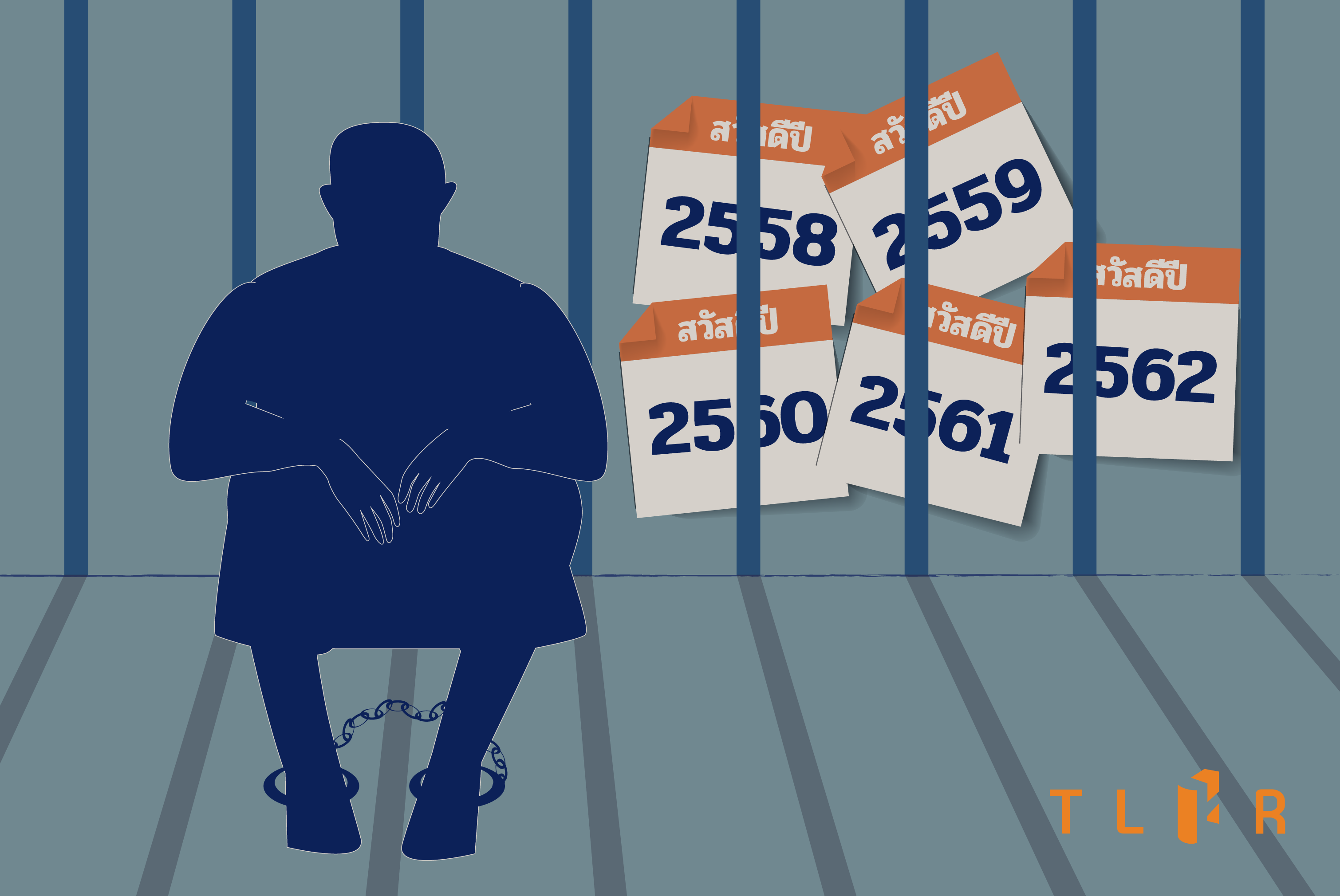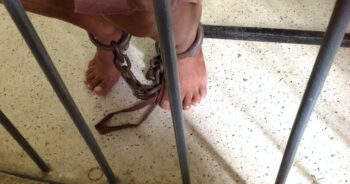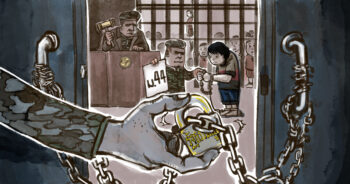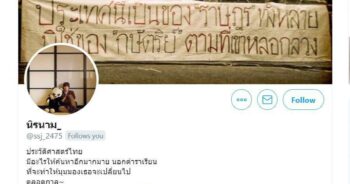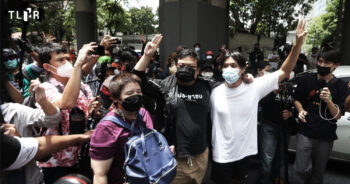“Has the court ruled yet?”
“They will rule this time, won’t they?”
Defence lawyers are repeatedly asked these questions by the defendants at every hearing at the Bangkok Military Court.
“It will be a long time until the next witness hearing. And my brother remains in jail. My time should be put to better use, for business. I’m done with politics,” said a relative of a defendant who was charged with terrorism and association with the bombing of the Criminal Court. The words still echo in the mind of the observers at the Bangkok Military Court that day.
The preamble clause “to facilitate the maintenance of peace and order during the transitional time in the society” of National Council for Peace and Order (NCPO) Announcement 37/2014 sets up a condition for military courts to assume jurisdiction over cases where the defendant is charged with several criminal offences. One implication of maintaining peace and order is the speed of finalising cases falls under its purview. However, once examined closely, the speed of prosecution should refer to “the effectiveness of the trials throughout the proceedings,” ranging from the police investigation, the prosecutor’s indictment order, and the tribunal adjudication.
Entering into the NCPO’s fifth year in power, the facts appear in contrast to the objective and implication established in its announcement. The entire prosecution in military courts in fact proceeds with “delays.”
National Council for Peace and Order (NCPO) Announcement 37/2014: Civilians ordered to be tried in military courts
NCPO Announcement 37/2014 on Offences under the Military Court’s Jurisdiction orders all civilians not affiliated with the Ministry of Defence or not serving as military personnel to be tried in military courts for certain offences. A number of criminal offences set out in Announcement 37/2014 are: a) offences against the King, the Queen, the Heir, and the Regent under Articles 107 – 112 of the Criminal Code, including royal defamation or lèse-majesté under Article 112, b) offences in relation to national security under Articles 113 – 118 of the Criminal Code, c) offences under NCPO orders and announcements for crimes committed during the enforcement of this Announcement, whether inside or outside of Thai territory, and d) offences in relation to the possession of unlicensed wartime firearms, ammunition, and explosive devices since 22 May 2014 per NCPO Announcement 50/2014.
Later, the Head of NCPO issued Order 55/2016 to revoke the jurisdiction of military courts over civilian cases, citing people’s intention and cooperation in leading the country to sustainable peace and development. The order however fails to apply to cases already indicted by military prosecutors and cases pending in military courts. In other words, individuals prosecuted for crimes committed between 25 May 2014 and 12 September 2016, prior to the enforcement of Order 55/2016, continue to be tried by military courts. According to the Judge Advocate-General’s Department, there are 281 cases, prosecuted between 25 May 2014 and 30 June 2018, still pending.
Thai Lawyers for Human Rights (TLHR) has litigated a total of 58 civilian cases in military courts, amounting to 111 individuals. Among the 58 cases, 31 have concluded, 18 in which the defendants pleaded guilty. Twenty-five cases are still pending at court. In effect, 60 civilians remain subject to the Military Court’s jurisdiction, with eight cases scheduled to proceed this month. The other two cases, involving 16 individuals, are pending investigation at an earlier stage. Five of the 16 individuals are being prosecuted in both cases. The remaining 16 are at risk of being tried in military courts in the future if indicted.
Types of delays in military courts
Thai Lawyers for Human Rights classified the delays found in military courts into two types: a) delays in proceedings of cases relating to the coup, and b) delays by repeated postponements of the plaintiff’s witness examination. The classification derives from TLHR’s documentation of proceedings in all 58 cases during 22 May 2014 and 15 March 2019. In some cases, more than one type of delay was found.
The first type, ‘delays in proceedings of cases relating to the coup,’ has three major causes. First is the jurisdiction determination between military and civilian courts. This cause of delay is due to the fact that a number of defendants had requested a consideration of the NCPO Order which gives military courts jurisdiction over civilian cases, contesting that the crimes had been committed prior to the enforcement of the order and that the case should be subject to a civilian court instead. There are seven cases in this category.
Another cause of delay is medical examinations of defendants and suspects with Schizophrenia. Some defendants needed to establish in court the fact that they had Schizophrenia. Per the National Mental Health Committee’s Regulations, the defence lawyers therefore argued to have them examined by a physician at a medical centre that provides service to patients with mental conditions and psychiatric patients, to evaluate whether they could proceed with the trial. Three cases fit into this category.
The third cause of delay identified results from irregularities found in trials conducted at military courts. Irregularities throughout the proceedings range from the transfer of detained defendants to a military court, the request to change the panel of judges due to the sitting judge’s decision to eliminate a witness or witnesses vital to the trial – potentially causing serious harm to the standing of the case, and the contestation of the military panel of judges, which ruled on an elimination of vital evidence. This category also covers unexplained delays in the police investigation, the prosecutor’s postponement of an indictment order, and the rescheduling of court hearings. Seven cases are found in this category.
Cause | Case | Delay period (From incident till next hearing) (Days) |
A) Jurisdiction determination between the Military Court and the Civilian Court | 1. Resistant Citizen organized an activity “We (Love) Elections” on 14 February 2015 in front of Bangkok Art and Culture Centre (BACC). Defendants include students, activists, lawyers, and individuals affected by the use of force during the military’s operations in 2010. (Offence: violation of NCPO Announcement 7/2014 banning political gatherings) | 683 |
2. Sirapob (last name withheld), a poet and blogger, was charged by the authorities for composing and publishing a poem online. (Offences: royal defamation or lèse-majesté under Article 112 of the Criminal Code and violation of Article 14(3) of the 2007 Computer Crime Act) | 617 | |
3. A group of student activists protested in front of Bangkok Art and Culture Centre (BACC) on 22 May 2015 to mark the first anniversary of the coup. (Offence: violation of Head of NCPO Order 3/2015 banning political gatherings of five or more persons) | 515 | |
4. A group of individuals were charged with possession of RGD5 bombs based solely on incrimination from the testimony of one witness. The authorities attempted to ask defendants leading questions that could link them to a violent underground movement. Facts also indicate that the defendants had been tortured during detention. (Offences: possession of an explosive device and violation of NCPO Announcement) | 417 | |
5. Seven students and activists rode a train to Prachuap Khiri Khan Province to examine a corruption scandal of the Rajabhakti Park on 7 December 2015. (Offence: violation of Head of NCPO Order 3/2015 banning political gatherings of five or more persons) | 369 | |
6. Punsak Srithep, a member of Resistant Citizen, faces prosecution for marching alone from his residence to report to the Bangkok Military Court related to the Resistant Citizen’s activities for calling for justice. (Offences: sedition under Article 116 of the Criminal Code, violation of the Computer Crime Act, and violation of NCPO Announcement) | 249 | |
7. Thanakorn (last name withheld) was charged on three counts: sedition for sharing a corruption diagram of Rajabhakti Park created by New Democracy Movement and posted on their Facebook page, royal defamation for liking a Facebook page deemed critical of the monarchy, and for publishing a message relating to King Rama IX’s dog on his own Facebook page. | 162 | |
B) Medical examination of defendants and suspects with Schizophrenia | 1. Ruecha (last name withheld) was charged with royal defamation for posting a message with the belief that he was a medium of Mother Earth. Delays occurred due to a medical examination and the defendant’s inability to proceed with the case. | 417 |
2. Prachakchai (last name withheld) was charged with royal defamation for submitting a petition to have the King’s title dismissed. Delays occurred due to a medical examination. | 381 | |
3. Boobpha (last name withheld) was charged with royal defamation for posing her Facebook page with belief that she was a member of the royal family, claimed to be a royal spy who must comply with royal law. Delays occurred as a result of waiting for the result of a medical examination. Later, the court could not summon the physical to give testimony. | 328 | |
C) Irregularities in the Military Court’s proceedings | ||
C.1) The Civilian Court delayed the transfer of defendants to the Military Court | 1. Jatupat Boonpattararaksa, or ‘Pai Dao Din,’ faces prosecution for holding up an anti-coup placard at the Victory Monument in the north-eastern province of Khon Kaen. (Offence: violation of Head of NCPO Order 3/2015 banning political gatherings of five or more persons) | 110 |
C.2) Defendant(s) requested for a change of the judge’s panel, with delayed scheduling of the new judge’s panel | 2. Thanet Anantawong, a pro-democracy activist, was charged for posting a corruption diagram of the Rajabhakti Park. (Offences: sedition under Article 116 of the Criminal Code and violation of the 2007 Computer Crime Act). | 210 |
C.3) Contestation of military courts; elimination of vital witness(es) | 3. Seven students and activists were charged for riding a train to Prachuap Khiri Khan Province for examining a corruption scandal surrounding Rajabhakti Park. | 298 |
C.4) Delayed indictment, repeated postponements, and other unexplained delays between proceedings | 4. Individuals dispatched leaflets containing information about the 2016 Constitutional Referendum in Bang Sao Thong district. The cases were filed separately against each individual. One of the suspects, Rangsiman Rome, experienced the longest period of time between the indictment submission by a prosecutor and the hearing of a complaint and a statement of defense at the court. (Offences: violation of Head of NCPO Order 3/2015 and violation of the 2016 Constitutional Referendum Act) | 210 |
5. Jue-seng Sae-Kow, or Small Bandit Aneeya, was charged with royal defamation for commenting on the 2016 draft Thailand Constitution at an academic seminar organised by New Democracy Movement. Delays occurred between his indictment submission and hearing a statement of defense: between a hearing a statement of defense and deposition of the list of witnesses and evidence. (Offence: royal defamation under Article 112 of the Criminal Code) | 304 | |
6. Patnaree (last name withheld), mother of prominent activist ‘Ja New,’ was charged for responding in a private conversation with a ‘Ja,’ a colloquial, non-committal response in Thai. Delays occurred between her indictment, a hearing a statement of defense, and deposition of the list of witnesses and evidence. (Offences: royal defamation under Article 112 of the Criminal Code and violation of the 2007 Computer Crime Act). | 240 | |
7. Individuals charged for alleged possession of RGD5 bombs. Delays occurred between their indictment and mediation hearing. | 210 |
Cause b) of delays in military courts was mainly due to repeated postponements of the examination of the plaintiff’s witness(es). Eight cases have had more than five reschedulings of the same hearing. Reasons cited for the request to postpone include the failure to summon a civilian to appear in a military court. Witnesses with government positions are sometimes occupied with state duty or have been reappointed to other posts, posing difficulties in the successful delivery of summonses. It is important to note that, in cases where there are delays due to the examination of the plaintiff’s witness(es), the cases are often in relation to royal defamation or weapons possession offences, both of which have been continuously used by the authorities to prosecute civilians after the 2014 coup.
Case | Total number of hearings scheduled (Times) | Number of postponed/rescheduled hearings (Times) and Percentage of hearings delayed out of total number of hearings (Percent) | Delay period (Days) | Reasons for the delay in the examination of the plaintiff’s witness(es) |
1. Sirapob (last name withheld), charged with royal defamation | 22 | 8 (36%) | 679 | A civilian witness could not appear in court. (8 times) |
2. Hired bombing of the Criminal Court | 35 | 10 (28.5%) | 611 | – The witness was on state duty. (2 times) – The Court could not summon a civilian witness. Some of the witnesses summoned failed to report as the prosecutor’s witnesses in court. (8 times) |
3. Anchan (last name withheld), charged with royal defamation (29 counts) for sharing a video clip. The crime was committed during the imposition of martial law, meaning the verdict could not be appealed to a higher court | 20 | 8 (40%) | 600 | Delay of plaintiff’s witnesses six times due to: – A police witness and a civilian witness were on state duty. (4 times) – A civilian witness did not receive a summons. (1 time) – A civilian witness did not appear in court due to unknown reasons. (1 time) |
4. 14 defendants were alleged to have thrown grenades at the Criminal Court. Some were allegedly tortured for confession during military detention | 42 | 12 (28.5%) | 502 | – A police witness was on urgent state duty. (6 times) – The plaintiff could not summon civilian witnesses due to urgent business and death. (5 times) |
5. Prachakchai (defendant with a mental condition), charged with royal defamation | 21 | 6 (28.5%) | 485 | A police witness failed to appear in court due to sickness, state duty, and undeliverable summons. (4 times) |
6. Possession of RGD5 bombs | 25 | 10 (40%) | 480 |
|
7. Jue-seng Sae-Kow, or Small Bandit Aneeya, charged with royal defamation | 21 | 6 (28.57%) | 452 | The plaintiff could not summon witnesses and a police witness retired. (4 times) |
8. Thara (last name withheld) was charged with royal defamation for sharing six video clips. The crime was committed during the imposition of martial law, meaning that the verdict could not be appealed to a higher court. | 10 (Defendant pleaded guilty) | 5 (50%) | 415 | Civilian and military personnel witnesses failed to appear in court. (3 times) |
Lawyers at Thai Lawyers for Human Rights reflected that the witness examination process causes regular, repeated delays, which put a greater burden on the defendants. Causes of these delays are reflected as follows:
- The Military Court adopts a “one hearing appointment at a time” policy where it schedules an examination of only one witness per time. After the examination concludes, it then proceeds to schedule a hearing of the next witness on the list, and so forth. If the witness summoned fails to appear in court on the hearing day, the Military Court adjourns the hearing altogether instead of examining the next witness on the list. The Court also rules to not eliminate, on grounds of non-vitality, the witness(es) who repeatedly fail to appear when summoned. The Court further schedules only “half a day” for each hearing. Its “one hearing appointment at a time” policy is in contrast with its civilian counterpart, which sets out a “consecutive hearing schedule,” establishing clear dates of witness examinations beforehand. In cases where witnesses cannot appear in court, they are required to give evidence of their absence to the Court on necessary and reasonable grounds, including illness. The Civilian Court strictly practices its discretion in postponing the hearings per Articles 8(1) and 179 of the Criminal Procedure Code. Article 8(1) establishes that “an accused is entitled […] to be tried in a case speedily, continuously and fairly.” Article 179 states that “[s]ubject to the provisions of the [Criminal Procedure] Code or other laws, the Court may proceed with the trial without adjournment until the trial is over. If the witnesses do not appear or there is any other reasonable ground for the adjournment of the trial, the Court shall adjourn the case as it thinks fit.”
- The Military Court’s administration is not equipped with a fully functioning subpoena system. It can only summon witnesses of both parties to the court, as is also done by the Civilian Court per the Criminal Procedure Code. However, the Military Court does not require its personnel to report the delivery status of the subpoena in the case file, in contrast to its civilian counterpart where both the plaintiff and the defence are informed beforehand whether a witnesses has been successfully summoned and, if not, the reasons for the failure to do so. In military courts, neither party has a channel to learn before the hearing day about instances where a witness has not been reached. As a result, the defendant(s) and the defence lawyer(s) waste a day in court for one postponement at a time.
- The Military Court has no penalty set in place for vital witnesses who fail to report when summoned. There is no system by which to issue an arrest warrant for, file a lawsuit against, or temporarily detain these witnesses. This practice is in contrast to the Civilian Court, which follows Article 111(2) of the Civil Procedure Code and Article 170 of the Criminal Code. The former states that “[i]f the Court is of the opinion that the witness, duly served with a subpoena, has wilfully failed to appear in Court, or that the witness ordered by the Court to stay on has wilfully disappeared, the Court may adjourn the hearing of the case and issue a warrant of arrest and have the witness detained until his testimony has been taken on such day as the Court thinks fit, without prejudice to the punishment provided by Article 147 of the Criminal Code.” Article 170 establishes that “[w]hoever, refusing to comply with a writ or order of the Court requiring him to come and make a statement, to come and give evidence or to forward any property or document in any judicial proceeding, shall be punished with imprisonment not exceeding six months or fined not exceeding one thousand Baht, or both.” In some cases, the prosecutor’s witnesses had requested for a postponement themselves, while they had already been informed of the hearing date prior by the military prosecutor.
Effects of prolonged proceedings
The prolonged proceedings due to the causes listed above have consequently resulted in many civilian cases pending unnecessarily in military courts. Given its affiliation with the Ministry of Defence, there are concerns about the Military Court’s impartiality and independence. As a result, defendants and suspects often face difficulties in gaining access to the right to a fair trial.
According to Thai Lawyers for Human Rights’ documentation, defendants have been directly impacted by the prolonged process in three ways, as follows:
1) Defendants have been extensively detained due to failure to secure temporary release with bail. Four out of 58 cases fit this profile. Sirapob’s proceedings have been subjected to the most delays; he has been imprisoned for four years and eight months, amounting to 1,634 days. Sirapob was refused temporary release despite having his lawyer submit requests for bail seven times, the latest being on 5 November 2018 with a bail amount of THB 500,000 (approximately USD 15,850).
If Anchan had not been granted temporary release on 2 November 2018, she would have been detained for more than three years and nine months, or more than 1,380 days.
Effect: Defendants have been extensively detained during the entire period of the proceedings without bail. | |
Case | Detention period (Information as at 15 March 2019) |
1. Sirapob (last name withheld), charged with royal defamation | 4 years, 8 months (1,634 days) |
2. Possession of RGD5 bombs | 4 years, 6 months (1,584 days) |
3. Bombing of the Criminal Court (five defendants out of 14 continue to be detained and have not been granted temporary release) | 4 years (1,471 days) |
4. Hired bomb at the Criminal Court | 4 years (1,462 days) |
*Note: Anchan (last name withheld), charged with royal defamation, was just released on bail on 2 November 2018. | 3 years, 9 months (1,380 days) |
2) Defendants have pleaded guilty in military courts in order to expedite the proceedings and to secure a reduction of their sentence. In cases relating to royal defamation or national security offences, more often than not the defendants are not granted temporary release. TLHR found three cases where the defendants decided to plead guilty during the examination of the plaintiff’s witnesses, because they could not endure the prolonged proceedings in military courts. This is due to the defendants’ belief that the political climate would remain repressive and would not give a positive push to their case. These defendants were detained for 504, 414, and 395 days, respectively, before pleading guilty.
Effect: Defendants pleaded guilty as a result of prolonged proceedings in military courts. | |
Case | Detention period before confession (Days) |
1. Thara (last name withheld) charged with royal defamation under Article 112 of the Criminal Code. | 504 |
2. Wichai (last name withheld) charged with royal defamation under Article 112 of the Criminal Code for a fabricated Facebook account used to publish posts. | 414 |
3. Samak (last name withheld) charged with royal defamation under Article 112 of the Criminal Code for damaging a royal portrait in public. He has a mental health condition. | 395 |
3) Defendants have ended up spending a lot of financial resources to fight their cases, including for bail of defendants tried in military courts, or in transportation costs to the military court in cases where defendants were granted bail. The Military Court does not have a regulation granting provisional release without bail, in contrast to the Civilian Court where the provisional release is subject to the court’s discretion in cases where the maximum sentence is less than five years’ imprisonment per the Criminal Procedure Code. All cases under the Military Court’s jurisdiction require the defendants to gather financial resources for the submission for release.
For civilian cases tried in military courts that are handled by Thai Lawyers for Human Rights, 32 cases have put forward a release submission. Twenty-five of which have been granted provisional release by the court, with bail ranging from THB 10,000 (approximately USD 317) to THB 1,008,000 (approximately USD 31,950). The amount of bail surety of the 25 cases totals more than THB 7,060,000 (approximately USD 223,770). The cost of bail poses an enormous burden on the defendants’ or their relatives’ financial situation. Most of these defendants are regular citizens who have been forced to gather resources to trade for their freedom after being prosecuted for the exercise of the right to freedom of expression, association, and peaceful assembly without weapons.
“Delays” in contradiction with the NCPO’s justification
Closer examination of the causes and implications of granting the Military Court jurisdiction over civilian cases per NCPO Announcement 37/2014 shows that one of the reasons given was the “speed” of the proceedings under military rule. Instead, the facts establish many “delays” of trials relating to the coup and due to the repeated postponement of the examination of the plaintiff’s witnesses. Such necessity to “speed up” the proceedings therefore does not constitute a reasonable claim, rendering the enforcement of NCPO Announcement 37/2014 illegitimate.
On 12 September 2016, the NCPO issued Head of NCPO Order 55/2016 to revoke power under the Announcement. Criminal offences – including those against the King, national security-related crimes, violation of NCPO orders and announcements, and wartime weaponry offences – were returned to the jurisdiction of civilian courts. The revocation however does not apply to pending cases in military courts, and ongoing or future cases of any crimes committed between 25 May 2014 and 12 September 2016. Twenty-five civilian cases handled by Thai Lawyers for Human Rights are still pending at military courts, amounting to 60 civilians. The number of pending cases marks the ongoing illegitimate, ineffective law enforcement of the NCPO. It further poses the risk of civilians’ lack of access to the right to a fair trial when engaged in court proceedings as well as police and prosecutor stages.
The right to a fair trial is guaranteed in the Universal Declaration of Human Rights (UDHR) and Article 14 (3) (c) of the International Covenant on Civil and Political Rights (ICCPR). It includes the right “to be tried without undue delay” with counsel of his[/her] own choosing in police, prosecutor, and court stages to ensure that all defendants have full access to justice and fairness. As a member state of the above-mentioned Covenant, Thailand must fully comply with the human rights obligations outlined. At the minimum, the Thai government must ensure that the administration of justice proceeds promptly without delay. Currently, the Court of Justice’s Judicial Regulations consists of an article that requires all court personnel to expedite trials in criminal proceedings, in order to reduce the overwhelming number of pending cases in court each year and to ease the financial and legal burdens on the plaintiff and the defence. The article establishes a mediation meeting for both parties, and sets out a clear, consecutive hearing schedule with the full sitting of the panel of judges, in accordance with the Criminal Procedure Code. Such regulations are absent in the Military Court’s administration. Although the statistics regarding the timeline of both courts’ proceedings cannot be documented and compared at the present moment, delays in military courts indicate that Thailand fails to guarantee the right to be tried without undue delays, in breach of international law, when brining civilian cases under the Military Court’s jurisdiction.
This article maps out the unravelling of injustice based on the NCPO’s unsuccessful claim of speediness, the state’s evasion to comply with international laws, which it has ratified, and the failure to guarantee the prompt administration of justice. There is an urgent need for the NCPO to halt the practice of trying civilian cases in military courts – despite the fact that the crimes have been committed prior to the enforcement of Head of NCPO Order 55/2016. All pending cases must be transferred to the Court of Justice to ensure that: a) the right to a fair trial is protected, b) the proceedings are in full compliance with the minimum standards outlined in the Criminal Procedure Code, and c) there are no further delays in the administration of justice.
In the light of the March 2019 elections, political parties and candidates elected as part of the new government in support of human rights and democracy must set an agenda to tackle unfair proceedings, in both military and civilian courts, during the NCPO’s administration since May 2014 – in particular, civilian cases pending in military courts.
A trial must have an end in sight.
Schedule clear, consecutive hearing dates to allow people to go on living their lives.
This might just be the answer for defendants and their relatives who face difficult times when they and their loved ones face prosecution because of the NCPO’s abuse of power.
